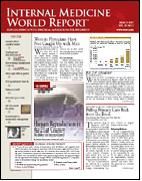Early Morning BP Spike Helped by Telmisartan
Early Morning BP Spike Helped by Telmisartan
From the European Society of Hypertension
PARIS—Treatment for 6 weeks with a fixed-dose combination of telmisartan/ hydrochlorothiazide (MicardisHCT; either 40 mg/12.5 mg, respectively [T40/H12.5], or 80 mg/12.5 mg, respectively [T80/H12.5]) provides significantly superior blood pressure (BP) reductions compared with losartan/hydrochlorothiazide (Hyzaar, L50/H12.5; 50/12.5 mg, respectively) in patients with mild-to-moderate essential hypertension, new data presented at the 14th meeting of the European Society of Hypertension suggest. The significantly greater efficacy of telmisartan/hydrochlorothiazide was apparent over 24 hours and also during the last 6 hours of the dosing interval, a time period when a steep surge in BP is known to increase the rate of cardiovascular events.
Joel M. Neutel, MD, of the Orange County Heart Institute, Tustin, Calif, and colleagues, compared the effects of the angiotensin II receptor blockers telmisartan and losartan in fixed-dose combination with hydrochlorothiazide throughout the 24-hour dosing interval in 805 patients with mild-to-moderate hypertension. Primary end point was the change in diastolic BP from baseline during the last 6 hours of the 24-hour dosing interval measured using ambulatory BP monitoring (ABPM) after 6 weeks of treatment. An overall significant (P = .004) treatment effect on the primary end point among the 3 active treatments was noted. Both telmisartan fixed-dose combinations showed a significant difference versus the losartan fixed-dose combination.
Adjusted mean reductions in the last 6-hour ABPM diastolic BP were 12.1 mm Hg for T40/H12.5 (P = .031) and -13.0 mm Hg for T80/H12.5 (P = .003) versus -10.2 mm Hg for L50/H12.5.
“It is well known that blood pressure falls during sleep and sharply rises when the patient awakens, and it is this morning blood pressure surge which coincides with an increase in life-threatening cardiovascular events between 6 am and noon,” Dr Neutel said.
These results suggest that T40 or 80/H12.5 may be more effective at attenuating the morning BP hike, and, in turn, the risk of cardiovascular events.
These findings come in the wake of the MICARDIS Community Access Trial II, which was reported at the 19th annual meeting of the American Society of Hypertension, which showed that once-daily telmisartan provided highly consistent BP control, especially in patients who were untreated or inadequately treated.
From the Collegium Internationale Neuro-psychopharmacologicum Congress
Memantine Monotherapy Shows Promise for Early AD
PARIS—Memantine (Namenda), which is approved by the FDA for the treatment of moderate-to-severe AD, also is safe and effective for patients with mild-to-moderate Alzheimer’s disease (AD), investigators announced at the XXIV Collegium Internationale Neuro-psychopharmacologicum (CINP) Congress.
Elaine R. Peskind, MD, of the University of Washington, Seattle, reported results in 403 patients with a diagnosis of possible AD who had been randomized to 24 weeks’ treatment with memantine, 20 mg/d (10 mg bid titrated up over a 4-week period), or placebo. Primary outcome measures were the Alzheimer’s Disease Assessment Scale-cognitive subscale (ADAS-cog), and the Clinician’s Interview-Based Impression of Change-Plus Caregiver Input (CIBIC-Plus), a measure of global status.
Memantine-treated patients performed significantly better than patients receiving placebo on both the ADAS-cog (P = .003) and the CIBIC-Plus (P = .004). Memantine, 20 mg/d, was safe and well tolerated, and the rate of adverse side effects was similar in the 2 treatment groups.
The data suggest that memantine monotherapy may stabilize cognitive function or postpone further deterioration in early stages of AD. The study is the first prospective, randomized, placebo-controlled study in the United States examining the benefits of memantine monotherapy in patients with mild-to-moderate AD.
Sertraline HCl and Venlafaxine XR Equally Effective in Major Depression
PARIS—The selective serotonin reuptake inhibitor (SSRI) sertraline HCl (Zoloft) is as effective as the serotonin norepinephrine reuptake inhibitor (SNRI) venlafaxine XR (Effexor XR) for treating patients with major depressive disorder (MDD), according to data presented at the CINP.
Tom George, MD, of the University of Queensland, Brisbane, Australia, reported results in 163 outpatients with MDD who had been randomized to treatment with sertraline HCl, 50 to 150 mg/d, or venlafaxine XR, 75 to 225 mg/d, followed by a 2-week taper period.
Results of the 8-week study showed similar quality-of-life improvements in the sertraline HCl and venlafaxine XR groups as assessed by the Quality of Life Enjoyment & Satisfaction Questionnaire (16.8 ± 1.8 vs 17.5 ± 1.8; P = .74).
Response rates were 71% in sertraline HCl-treated patients and 71% in venlafaxine XR-treated patients (P = .57). Response was defined as a reduction in Hamilton-Depression Rating Scale (HAM-D) scores of at least 50%. Remission rates (defined as a HAM-D total score of £7) were 60% and 54% in the 2 groups, respectively (P = .47).
Although the 2 treatments were similarly well tolerated in the acute treatment phase, discontinuation rates differed (16% with sertraline vs 30% with venlafaxine; P = .06).
